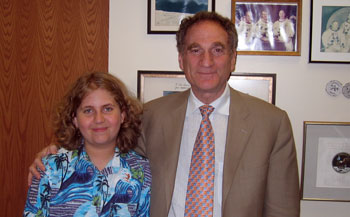Teen Philanthropist Supports Research to Help Others
 |
Until recently, Noah Perkins had never heard of Dr. Jack Kessler. Nor was he familiar with Dr. Kessler’s pioneering work with stem cells or spinal cord injuries. That changed when he saw Terra Incognita, a documentary film that features Dr. Kessler and his daughter, Allison, as part of the Reeltime Film Series earlier this year.
The film, directed and produced by Maria Finitzo of Kartemquin Films, struck a chord with Noah and spurred his decision to raise funds in support of Dr. Kessler’s work as part of his Bar Mitzvah “Tikkun Olam,” or repairing the world, service project. In combination with a friend’s recent diagnosis and treatment for cancer, the film helped him understand the need to further medical research. “There is a need to help people,” Noah said, “and Dr. Kessler is making great progress.”
While studying for his Bar Mitzvah at the Jewish Reconstructionist Congregation (JRC) in Evanston, he raised more than $2,500 to support Dr. Kessler’s research. Noah—who will turn 14 in August—met with Dr. Kessler on June 24, to present his donation and tour the research laboratory featured in the film.
Through the story of Dr. Kessler, the Ken and Ruth Davee Professor of Stem Cell Biology at Northwestern University’s Feinberg School of Medicine and chair of the Department of Neurology at Northwestern Memorial Hospital, and his daughter, Allison, an undergraduate student at Harvard University, Terra Incognita puts a human face on stem cell research. Dr. Kessler’s research had centered on the understanding and treatment of nerve disorders, such as diabetic neuropathy, but when a skiing accident left his then-15-year-old daughter a paraplegic, he turned his focus from peripheral nerve disorders to spinal cord injuries.






